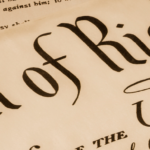Does Michigan Have the Death Penalty?
Michigan was the world’s first English-speaking government to abolish the death penalty for ordinary crimes. The Michigan Legislature voted to abolish the death penalty in 1846, and it has been the law ever since.

With one exception, all executions in areas that are now Michigan were performed before statehood in 1837.
Although Michigan had outlawed the death penalty after becoming a State, the United States government hung Anthony Chebatoris at the Federal Correctional Institution in Milan, Michigan, in 1938. Mr. Chebatoris was convicted of a murder that occurred while he robbed a federal bank in Midland, Michigan. Because the execution was performed under the authority of the United States and in a facility on land owned by the federal government, which it had (and still has) exclusive jurisdiction under the United States Constitution, it technically did not occur within Michigan because federally owned lands are not legally part of the state where they are located.
The death penalty was made unconstitutional in the 1963 Michigan Constitution.
In 1997, Marvin Gabrion was sentenced to death for the murder of Rachel Timmerman in Newaygo County, Michigan. Prosecutors were able to seek the death penalty because the murder took place on federal land. Gabrion became the first person in the United States to receive the federal death penalty for a crime committed in a non-death penalty state since the federal death penalty was reinstated in 1988. He was also the first person sentenced to death in Michigan since 1937. The sentence was overturned but reinstated in 2013.

Federal Death Penalty in Federal Courts Located in Michigan
In Michigan, while the state abolished the death penalty in 1846, it can still be imposed in certain federal cases due to the overarching jurisdiction of federal law over state law. This scenario arises when a crime is prosecuted in a federal court for violations of federal statutes. Federal courts operate under the ambit of federal law, which is applicable across all states, including Michigan, that do not have the death penalty at the state level. The types of crimes that can lead to federal charges and potentially the death penalty include terrorism, large-scale drug trafficking, certain types of murder, hate crimes resulting in death, and significant fraud against the federal government, among others. These are defined and penalized under the Federal Death Penalty Act.
The supremacy of federal law over state law in such matters is rooted in the Supremacy Clause of the U.S. Constitution, which establishes federal law as the supreme law of the land, overriding conflicting state laws. Therefore, even in a state like Michigan, a federal court can legally impose the death penalty for specific federal offenses. The process of arriving at such a sentence is intricate. It is governed by federal procedures and sentencing guidelines, with the decision to seek the death penalty typically made by the Attorney General of the United States after a comprehensive review. Despite its legal viability, it’s important to note that the actual imposition of the death penalty in federal cases is relatively rare and is subject to a rigorous legal process, including extensive appeals.
A Criminal Conviction Can Be Devastating, Even if Not Subject to the Death Penalty
Hiring the best possible criminal defense lawyer in Michigan is essential for anyone facing criminal charges, regardless of whether the death penalty is on the table, if they are innocent, or if there is overwhelming evidence of guilt. This importance stems from several key factors:
- Complexity of the Legal System: The legal system can be incredibly complex and difficult for laypersons to navigate. A skilled criminal defense lawyer understands the nuances of the law, court procedures, and the legal system, which is crucial for effective navigation through the process.
- Protection of Rights: A qualified defense attorney ensures your constitutional rights are protected throughout the legal proceedings. This includes the right to a fair trial, protection against unlawful searches and seizures, and the right to remain silent. An attorney will also guard against any potential miscarriage of justice, such as wrongful convictions or excessively harsh sentencing.
- Negotiation Skills: Experienced criminal defense lawyers often have strong negotiation skills that can be pivotal in plea bargaining. They can negotiate with prosecutors to potentially reduce charges, lessen penalties, or even get charges dismissed in certain cases.
- Knowledge of Local Court Systems and Personnel: Understanding the intricacies of the local court system and knowing the prosecutors and judges can significantly benefit your case. An experienced lawyer will have insights into local practices and tendencies, which can be used to tailor a more effective defense strategy.
- Experience in Handling Similar Cases: A seasoned criminal defense lawyer brings the experience of handling similar cases, which provides them with a deeper understanding of what strategies work best in different scenarios. This experience is invaluable in crafting a defense that maximizes the chances of a favorable outcome.
- Mitigation of Penalties: Even in cases where acquittal is unlikely, a good defense attorney can work to mitigate penalties, argue for alternative sentencing options like probation or community service, and help in navigating plea deals effectively.
- Support and Guidance: Facing criminal charges can be a stressful and overwhelming experience. A competent defense lawyer provides legal representation, emotional support, and guidance through this challenging time. They can help you understand the process, set realistic expectations, and provide counsel on the best steps to take.
- Impact on the Future: A criminal conviction can have long-lasting effects on your life, including employment opportunities, educational prospects, housing, and social relationships. An effective defense lawyer works to minimize these long-term consequences.
The role of a Michigan criminal defense lawyer, such as those with LEWIS & DICKSTEIN, P.L.L.C., is multifaceted and extends far beyond just arguing in court or fighting against the death penalty. They serve as protectors of your legal rights, negotiators, strategists, and guides through the legal process. Regardless of the potential penalties, having the best possible legal representation is crucial for anyone facing criminal charges.

Michigan Criminal Defense Attorneys
If you, or someone you know, are facing criminal charges, it is essential that you have expert legal representation. The attorneys at LEWIS & DICKSTEIN, P.L.L.C. are criminal law specialists. Criminal law is the only area of the law our firm practices. If you face felony or misdemeanor charges, do not hesitate to call us for a free consultation. We will take the time to talk with you, answer your questions, and work with you to devise a winning strategy for your case. Although Michigan doesn’t have the “death penalty,” it might feel like life is over with a criminal conviction. Do not trust your fate to the lowest bidder; your future and livelihood are worth too much.
Call us today at (248) 263-6800 for a free consultation or complete an online Request for Assistance Form. We will contact you promptly and find a way to help you.












